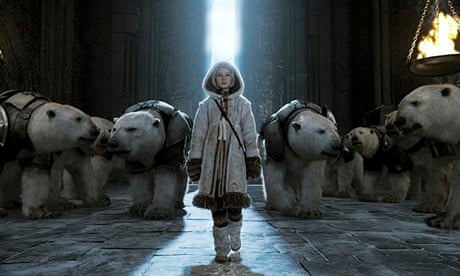There are many universes and many Earths parallel to each other. Worlds where Philip Pullman's His Dark Materials trilogy was turned into a series of blockbuster movies, each better than the last. And worlds like ours, where the series crapped the bed after a single bloated, confused outing that was mired in meddling and flaccid compromise, and succeeded only in enraging everybody that it was supposed to pander to. The film in this world is The Golden Compass, and it's rubbish. A bear punches another bear's jaw off in it, and it's still rubbish. That's quite a feat.
But what could have possibly gone wrong with an adaptation of a children's book about a plot to murder God, set in a world full of too many characters with hard-to-pronounce names that was overly concerned about explaining dust, and was released at a time when the public's tolerance for too-long, CGI-heavy fantasy adaptations was at an all-time low? The Golden Compass is being repeated on TV today, so this is the perfect time for a closer inspection.
"The ruling power, fearing any truth but their own ... forbade the very mention of Dust" – Serafina Pekkala
The main reason cited for the failure of The Golden Compass was its treatment of religion. The book made it perfectly clear that Philip Pullman had a specific problem with the Catholic church, but the film diluted his fury down to a general disenchantment with all dogmatic belief systems. However, this watering-down only succeeded in annoying secular groups (who really wanted to see a $180m epic about one man's suspicions about the Pope) as well as Catholics (who got wind of this new film being made about how awful they all were, and kicked off as a result). By trying not to offend anybody, the film managed to alienate everyone.
But that's not the real reason the film did badly. You just have to watch it to understand why it underperformed. Right from the word go, it forces a ton of information onto you in an incredibly ugly way. There's no "A long time ago in a galaxy far, far away". There's no baby wizard being left on a doorstep. There's no mystery or intrigue or elegance; just a woman we don't know babbling on about dust and demons and compasses in a vaguely off-putting manner. And that bloody compass. I remember seeing this film in the cinema, and being acutely aware of the extent to which I was wasting my life every time Lyra got her compass out and treated us to another almost identical 90-second animation about dust. Those animations are unbearably long and repetitive. They could be used on torture subjects.
"We'll set things right. We will. You, and me, and Iorek, and Serafina Pekkala, and Mr Scoresby" – Lyra
And because the film is in such a rush to spew out as much exposition as it can in the shortest possible amount of time, the amount of information that we're asked to absorb and retain becomes intimidating. The Golden Compass feels a bit like homework in that respect, as we're introduced to character after character after character, each seemingly from a different species. There are humans, but also all the spirit animals of the humans, and the witches, and the Gyptians, and the armoured bears, and the species where everyone looks and acts like a two-dimensional cartoon of every role that Sam Elliott has ever played.
So much of The Golden Compass's effort goes into this frantic world-building, overloading us with information that we'll never actually need because they did such a bad job making the film, that the actual plot – a little girl trying to stop children from having their souls physically ripped from them – is all but buried. In retrospect, perhaps it would have been better to hack away at the peripheries and give that story more space to breathe.
Observations

If feasting on the corpses of duff movies is your thing, then this Reddit post about the failure of The Golden Compass is something you should probably read:
It's a good thing that Daniel Craig is also James Bond, given his inability to create another lasting franchise from scratch. This film flopped, The Girl with the Dragon Tattoo flopped and Cowboys & Aliens flopped. And it's highly unlikely that anyone will ever make Munich 2: Bavarian Bonanza any time soon, either. Thank God for 007.
The failure of this film means that we'll never get a film of The Amber Spyglass. We'll never get to see the film where Nicole Kidman murders God. And for that reason alone, I really wish that The Golden Compass had done better.
Although The Golden Compass has gone down in the history books as a flop, let's not forget that it was the second-highest grossing non-sequel of 2007 in the UK. Proof that we'll definitely go and see anything if there are bits of Oxford in it (see also: Inspector Morse).
But let's not be sad about this. The Golden Compass still left its mark on society, even if that mark is the Ron Swanson Is My Spirit Animal Tumblr

Comments (…)
Sign in or create your Guardian account to join the discussion